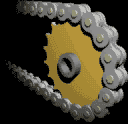Re: Nylon Timing Gear & chain replacement
Kenneth------
Just so everyone understands this. ALL 1966-91 Corvette PRODUCTION small blocks used an aluminum camshaft sprocket with nylon teeth, a powder metal crankshaft sprocket, and a Morse-type chain. ALL, every one ever made. GM ceased selling the nylon tooth camshaft sprocket in SERVICE more than 40 years ago in favor of the cast iron sprocket. But PRODUCTION applications used the nylon tooth. If one finds a 1966-91 small block that doesn't have one, then that engine has a replaced sprocket.
ALL 1965-74 Corvette big blocks used an aluminum, nylon toothed camshaft sprocket, a powder metal crankshaft sprocket, and a Morse-type chain. This includes L-88, ZL-1 and LS-6. GM NEVER offered a cast iron camshaft sprocket or steel crankshaft sprocket for big blocks in OEM SERVICE. The only sprockets ever available were nylon camshaft and powder metal crankshaft. If one finds anything but the foregoing in a 1965-74 big block, then it's been replaced with non-GM parts. For the better, of course.
Kenneth------
Just so everyone understands this. ALL 1966-91 Corvette PRODUCTION small blocks used an aluminum camshaft sprocket with nylon teeth, a powder metal crankshaft sprocket, and a Morse-type chain. ALL, every one ever made. GM ceased selling the nylon tooth camshaft sprocket in SERVICE more than 40 years ago in favor of the cast iron sprocket. But PRODUCTION applications used the nylon tooth. If one finds a 1966-91 small block that doesn't have one, then that engine has a replaced sprocket.
ALL 1965-74 Corvette big blocks used an aluminum, nylon toothed camshaft sprocket, a powder metal crankshaft sprocket, and a Morse-type chain. This includes L-88, ZL-1 and LS-6. GM NEVER offered a cast iron camshaft sprocket or steel crankshaft sprocket for big blocks in OEM SERVICE. The only sprockets ever available were nylon camshaft and powder metal crankshaft. If one finds anything but the foregoing in a 1965-74 big block, then it's been replaced with non-GM parts. For the better, of course.


Comment